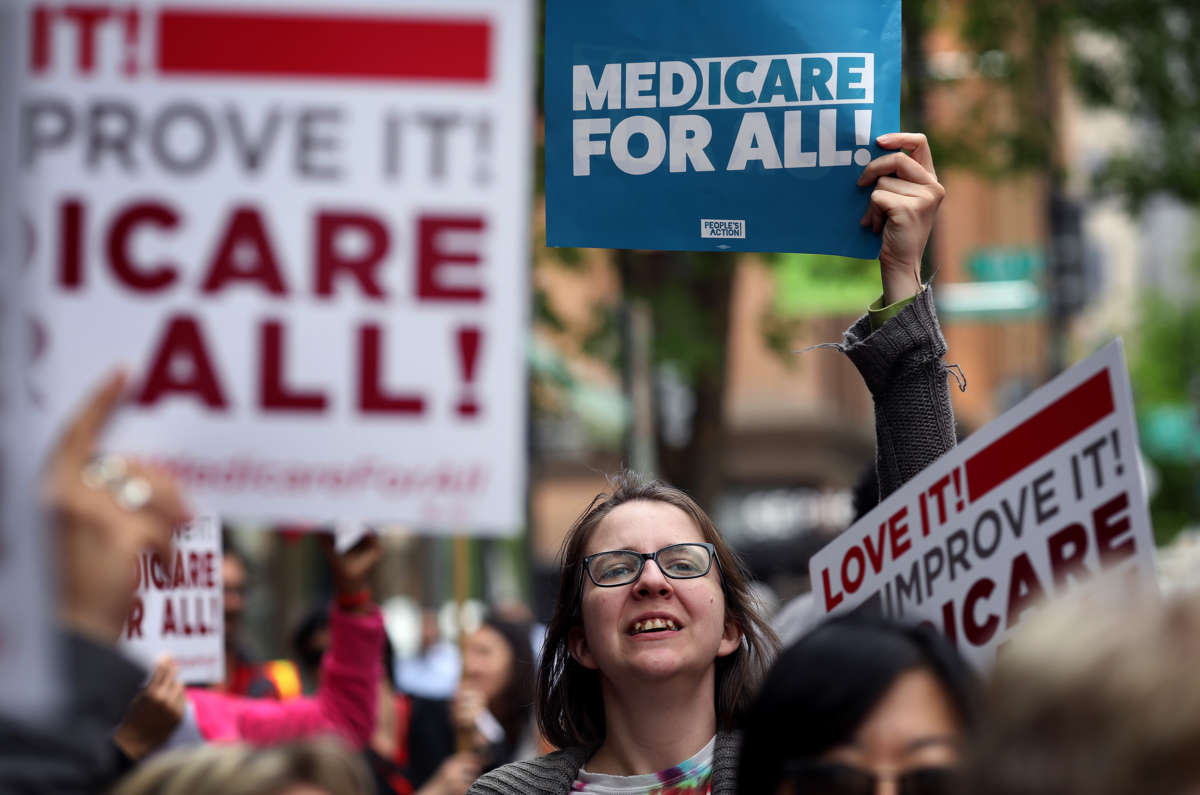Insurers and healthcare providers in the United States spent a staggering $812 billion on paperwork and other administrative burdens in 2017 alone, bureaucratic costs that could be dramatically reduced by switching to a single-payer system like Medicare for All.
That’s according to a study published Monday in the journal Annals of Internal Medicine, which found that administrative costs amounted to 34.2 percent of total U.S. national health expenditures in 2017 — twice the amount Canada spent on healthcare administration that same year.
The study’s authors noted that U.S. healthcare providers impose “a hidden surcharge” on patients “to cover their costly administrative burden.” U.S. insurers and providers spent $2,497 per person on healthcare administration in 2017 while Canada spent just $551 per capita, the study found.
“The average American is paying more than $2,000 a year for useless bureaucracy,” said Dr. David Himmelstein, lead author of the study and co-founder of Physicians for a National Health Program (PNHP). “That money could be spent for care if we had a Medicare for All program.”
If the U.S. brought spending on healthcare administration to Canadian levels, the study found, it could save $600 billion a year on total national healthcare expenditures.
“Medicare for All could save more than $600 billion each year on bureaucracy, and repurpose that money to cover America’s 30 million uninsured and eliminate co-payments and deductibles for everyone,” Dr. Steffie Woolhandler, a senior author of the study and co-founder of PNHP, said in a statement.
Himmelstein echoed that point in an interview with TIME. “The difference [in administrative costs] between Canada and the U.S. is enough to not only cover all the uninsured but also to eliminate all the copayments and deductibles, and to amp up home care for the elderly and disabled.”
“And frankly,” he added, “to have money left over.”
In 2017, *$812 BILLION* spent on administration by health insurers and providers. That's 34% of US health expenditures!!
US spending on administration (per capita) nearly 5-fold ↑ than in Canada ($2497 vs. $551)
Interesting new study in @AnnalsofIMhttps://t.co/4iscg9j2BS pic.twitter.com/6q9xyM7iLI
— Rishi Wadhera (@rkwadhera) January 7, 2020
The study, which is the first comprehensive analysis of administrative costs in the U.S. since 1999, was published as the debate over healthcare reform continues to feature prominently in the 2020 Democratic presidential race.
Sen. Bernie Sanders (I-Vt.), the leading advocate of Medicare for All in the 2020 race, has repeatedly emphasized the administrative savings single-payer would deliver. “Under a Medicare for All system,” the senator wrote in an op-ed last May, “we will no longer be paying those exorbitant CEO compensation packages, or the absurdly high administrative costs in the private insurance system.”
Sanders has also touted the simplicity of universal programs compared to means-tested alternatives. “One of the crises in America today is people are sick and tired of filling out forms,” Sanders said during the Democratic presidential debate in Los Angeles last month.
Former Vice President Joe Biden and former South Bend, Indiana Mayor Pete Buttigieg have both proposed maintaining the private health insurance system and creating a public option to cover the uninsured and those who can’t afford private coverage.
Woolhandler said that by leaving the inefficiencies of the current healthcare system largely intact, the public option alternatives offered by Biden and Buttigieg would not deliver anywhere near the administrative savings of Medicare for All.
“Reforms like a public option that leave private insurers in place can’t deliver big administrative savings,” Woolhandler said. “As a result, public option reform would cost much more and cover much less than Medicare for All.”
Consumer advocacy group Public Citizen highlighted the new study on Twitter and noted that it undercuts insurance industry fearmongering about the supposedly enormous costs of implementing Medicare for All.
“Industry wants you to think universal healthcare is too expensive,” Public Citizen tweeted. “In reality, it’s our current system that’s a wasteful, unsustainable disaster.”
Join us in defending the truth before it’s too late
The future of independent journalism is uncertain, and the consequences of losing it are too grave to ignore. To ensure Truthout remains safe, strong, and free, we need to raise $50,000 in the next 9 days. Every dollar raised goes directly toward the costs of producing news you can trust.
Please give what you can — because by supporting us with a tax-deductible donation, you’re not just preserving a source of news, you’re helping to safeguard what’s left of our democracy.
